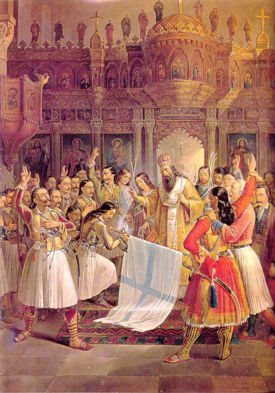Difference between revisions of "Germanos of Patra"
m (Bishop Germanos of Patra moved to Germanos of Patra) |
m (formatting) |
||
| Line 1: | Line 1: | ||
| − | ''' | + | Metropolitan '''Germanos of Patra''' (Greek: Παλαιών Πατρών Γερμανός, ''Palaion Patron Germanos'', George Gotzias, 1771-1826) was a hero of the [[w:Greek War of Independence|Greek War of Independence]] that he blessed with the proclamation of independence on [[March 25]], 1821, at the Monastery of [[w:Agia Lavra|Agia Lavra]]. |
| − | [[Image:Bishop-Germanos-1821.jpg|right|thumb|275px|Germanos proclaiming independence on [[March 25]], 1821 at the Monastery of [[w:Agia Lavra|Agia Lavra]]. Oil painting by [[w:Theodoros Vryzakis|Theodoros Vryzakis]], 1865.]] | + | [[Image:Bishop-Germanos-1821.jpg|right|thumb|275px|Germanos proclaiming independence on [[March 25]], 1821, at the Monastery of [[w:Agia Lavra|Agia Lavra]]. Oil painting by [[w:Theodoros Vryzakis|Theodoros Vryzakis]], 1865.]] |
| − | Like [[ | + | Like Patriarch [[Gregory V of Constantinople|Gregory V]], he was born in Dimitsana, Arcadia, on March 25, 1771. His name in the world was Georgios Gotzias, the son of jeweler Yiannis Gotzias. He entered the [[clergy]], becoming a [[deacon]], and left for theological studies in [[w:Smyrna|Smyrna]] in 1797. He became [[bishop]] of [[w:Patras|Patra]] in 1806 and in 1818 a member of the "Society of Friends" ([[w:Filiki Eteria|Filiki Eteria]]), which was seeking independence for the Greek nation from the Ottoman yoke. |
| − | On [[March 25]], 1821, he blessed the fighters at | + | On [[March 25]], 1821, he blessed the fighters at Agia Lavra in [[w:Achaea|Achaea]] and raised a banner of war. Tradition has it that as he had no flag, he used the curtain of the Holy Place of the church as a banner. The next day he led 500 men to attack the fortifications of Patra. |
| − | Germanos left Greece in 1822 for Italy hoping to obtain aid and support for the war effort from the Pope and the Roman Catholic Church but returned in 1824 without having seen him. He was accosted and robbed by [http://wiki.phantis.com/index.php/Yiannis_Gouras Yiannis Gouras' | + | Germanos left Greece in 1822 for Italy hoping to obtain aid and support for the war effort from the Pope and the Roman Catholic Church but returned in 1824 without having seen him. He was accosted and robbed by [http://wiki.phantis.com/index.php/Yiannis_Gouras Yiannis Gouras]' men the following year, during the infighting that broke out among the Greeks. |
| − | Bishop Germanos died in [[w:Nafplion|Nafplio]] on [[May 30]], 1826 after a short illness. | + | Bishop Germanos died in [[w:Nafplion|Nafplio]] on [[May 30]], 1826, after a short illness. |
| − | He wrote memoirs of the first two years of the | + | He wrote memoirs of the first two years of the Greek War of Independence that are invaluable to Greek historians. |
==Source== | ==Source== | ||
| − | * [http://wiki.phantis.com/index.php/Bishop_Germanos_of_Patra Bishop Germanos of Patra] at Phantis-Wiki | + | *[http://wiki.phantis.com/index.php/Bishop_Germanos_of_Patra Bishop Germanos of Patra] at Phantis-Wiki. |
| − | |||
| − | |||
| − | |||
| + | ==External link== | ||
| + | *[[w:Germanos of Patras|''Germanos of Patras'' at Wikipedia]] | ||
[[Category:Bishops]] | [[Category:Bishops]] | ||
| + | [[Category:Church History]] | ||
Revision as of 17:57, March 31, 2008
Metropolitan Germanos of Patra (Greek: Παλαιών Πατρών Γερμανός, Palaion Patron Germanos, George Gotzias, 1771-1826) was a hero of the Greek War of Independence that he blessed with the proclamation of independence on March 25, 1821, at the Monastery of Agia Lavra.

Like Patriarch Gregory V, he was born in Dimitsana, Arcadia, on March 25, 1771. His name in the world was Georgios Gotzias, the son of jeweler Yiannis Gotzias. He entered the clergy, becoming a deacon, and left for theological studies in Smyrna in 1797. He became bishop of Patra in 1806 and in 1818 a member of the "Society of Friends" (Filiki Eteria), which was seeking independence for the Greek nation from the Ottoman yoke.
On March 25, 1821, he blessed the fighters at Agia Lavra in Achaea and raised a banner of war. Tradition has it that as he had no flag, he used the curtain of the Holy Place of the church as a banner. The next day he led 500 men to attack the fortifications of Patra.
Germanos left Greece in 1822 for Italy hoping to obtain aid and support for the war effort from the Pope and the Roman Catholic Church but returned in 1824 without having seen him. He was accosted and robbed by Yiannis Gouras' men the following year, during the infighting that broke out among the Greeks.
Bishop Germanos died in Nafplio on May 30, 1826, after a short illness.
He wrote memoirs of the first two years of the Greek War of Independence that are invaluable to Greek historians.
Source
- Bishop Germanos of Patra at Phantis-Wiki.